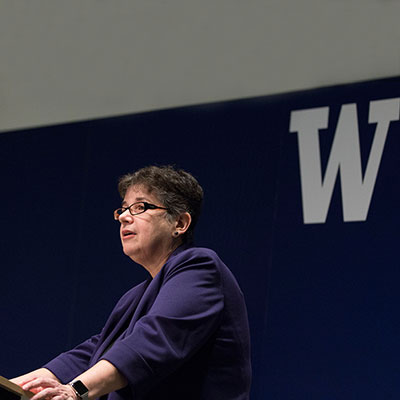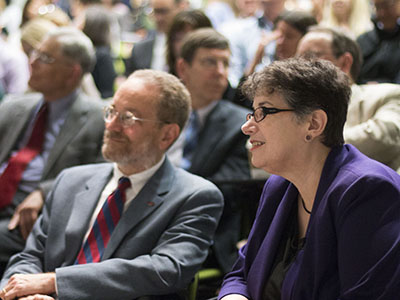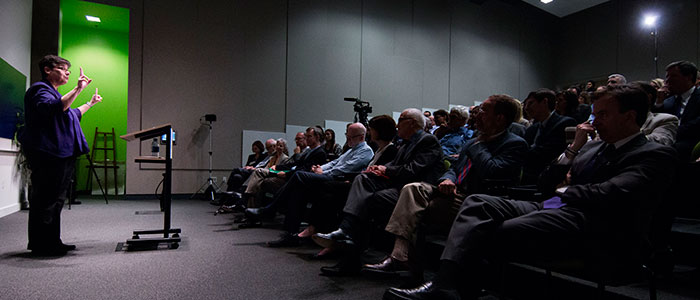University of Washington President Ana Mari Cauce on Tuesday invited the UW community and its partners to develop a long-range vision for improving health and well-being across the planet.

“We have an opportunity to help people live longer, healthier, more productive lives – here and around the world,” Cauce said in an address at UW Medicine’s South Lake Union campus.
The plan to create a long-term vision would start with the formation of a new Population Health Leadership Council that would develop an initial set of recommendations by January 2017, followed by a full 25-year vision and action plan.
Cauce said she would appoint members to the panel within the next few weeks. She would chair the council, which would consist of deans in the health sciences and members of other colleges and schools at the UW. An external advisory board will be essential to the process, she said.
The ultimate goal is to reduce health disparities, tackle the challenges of sustainability, and inspire the next generation of decision-makers. “Our aspiration is nothing less than to change the world,” Cauce said.

The UW could create new degrees in population health and create paths that encourage students to investigate population health-related questions, she said. Among the 150 people attending her talk were representatives of The Bill & Melinda Gates Foundation, PATH and the Washington Global Health Alliance.
Cauce said the population health effort would build upon the university’s ongoing interdisciplinary, data-driven approach. Among the examples she cited:
- The UW’s Institute for Health Metrics and Evaluation presents data that drives health policies around the globe. The National Institutes of Health now uses IHME data as one of its criteria in deciding where to fund $30 billion of research. “How cool is that?” Cauce said.
- UW Medicine has 26,000 employees and 5,000 students and trainees focused on a single mission: to improve the health of populations.
- The Department of Global Health has projects in 138 countries. One uses modern text messaging to help new and expectant mothers care for their babies. “Texting saving lives – remarkable,” Cauce said.
- Researchers from the UW School of Public Health and Fred Hutch led the largest study of its kind into disparities in breast cancer treatment and diagnosis. “What they found confirms the shameful existence of inequity in detection and treatment. Women of color were up to four times more likely to be diagnosed with cancer in its late stages, and they were at much higher risk of not receiving the recommended treatment at all,” Cauce said.
Cauce also singled out Dentistry students who serve patients in rural and underserved communities, Global Medicines Program pharmacy students who take part in medical brigades, and students in law and political science who work on human rights and labor issues in Central and South America.

"Over the next quarter century," Cauce said, "we will expand our ability to turn health evidence – to use our ability to diagnose patients, populations and the planet – into actionable policies, reforms, interventions and innovations. We will enlist all UW campuses, colleges, schools and units – those that are already driven by a mandate to improve population health and those that can contribute in ways perhaps less obvious, but just as important – in this effort."
See her speech, "A shared vision for improving health and well-being around the world."
(Jeff Hodson)
